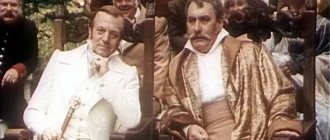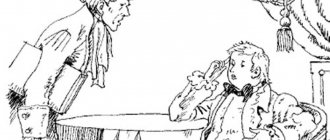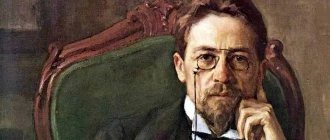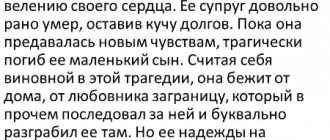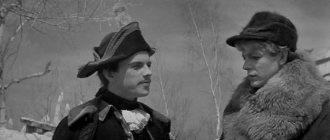Travel around Karelia
A.P. Chekhov.
Why Doctor Startsev became “Ionych”.
Chekhov is a master of the short story. He was an irreconcilable enemy of vulgarity and philistinism, hated and despised ordinary people living in their little world, shutting themselves off from everything in the world. Therefore, the main theme of his stories was the theme of the meaning of life.
At the end of the 90s, Chekhov created the so-called “little trilogy”, combining three stories: “The Man in a Case”, “Gooseberry”, “About Love”. These stories are connected only by a common theme, the theme of rejection of the case, whatever it may be. In the first story, Chekhov shows us in a grotesque form a man in a case, the Greek teacher Belikov. This figure is ominous, she instills fear in those around him, and only death reconciles him with the surrounding reality. As Chekhov writes, Belikov lay in the coffin almost happy; he had finally found an eternal case. In the second story, Chekhov writes about a man who had one and only dream in life - to become the owner of an estate and eat his own gooseberries. In the third, the landowner Alekhine talks about himself - about how he and his beloved woman did not dare to meet their love halfway and abandoned it. All these are manifestations of case life. The little trilogy therefore appears before us as a single work, internally complete. Chekhov intended to continue this cycle of stories and add new works, but he did not carry out his intentions. There is reason to think that at first the story “Ionych” also belonged to the cycle.
Dmitry Ionych Startsev, the hero of the story “Ionych,” was appointed as a doctor at the zemstvo hospital in Dyalizh not far from the provincial town of S. He is a young man with ideals and a desire for something high. In S. he meets the Turkins family, “the most educated and talented” in the city. Ivan Petrovich Turkin played in amateur performances, showed tricks, made jokes, Vera Iosifna wrote novels and stories for herself and read them to guests. Their daughter Ekaterina Ivanovna, a young pretty girl whose family name is Kotik, played the piano. When Dmitry Ionych visited the Turkins for the first time, he was fascinated. He fell in love with Catherine. This feeling turned out to be “the only joy and... the last” during his entire life in Dyalizh. For the sake of his love, he is ready, it would seem, to do a lot. But when Kotik refused him, imagining herself to be a brilliant pianist, and left the city, he suffered for only three days. And then everything went as before. Remembering his courtship and lofty reasoning (“Oh, how little those who have never loved know!”), he only lazily said: “How much trouble, however!”
Physical obesity comes to Startsev unnoticed. He stops walking, suffers from shortness of breath, and likes to snack. Moral obesity is also creeping up. Previously, he favorably differed from the inhabitants of the city with both the ardent movements of his soul and the ardor of his feelings. For a long time they irritated him “with their conversations, their views on life and even their appearance.” He knew from experience that you can play cards with ordinary people, have a snack and talk only about the most ordinary things. And if you start talking, for example, “about politics or science,” then the average person becomes confused or “gets into such a philosophy, stupid and evil, that all that remains is to wave your hand and walk away.” But gradually Startsev got used to such a life and got involved in it. And if he didn’t want to talk, he kept silent more, for which he received the nickname “the inflated Pole.” At the end of the story, we see that he spends every evening at the club, plays vint, has a snack and occasionally intervenes in the conversation:
- What are you talking about? A? Whom?
When Kotik became convinced that she had mediocre abilities, she lived in hope of Startsev’s love. But this is no longer the same young man who could come on a date at night to the cemetery. He was too lazy spiritually and morally to love and have a family. He only thinks: “It’s good that I didn’t get married then.”
The doctor’s main entertainment, “which he became involved in unnoticed, little by little,” was taking pieces of paper out of his pockets in the evenings, and then, when there was too much money, looking at houses intended for auction. Greed overcame him. But he himself could not explain why he alone needs so much money, if he is even depriving himself of theaters and concerts.
Startsev himself knows that he is “getting old, getting fat, declining,” but he has neither the desire nor the will to fight the philistine. The doctor's name is now simply Ionych. The journey of life is completed.
Why did Dmitry Startsev turn from a hot young man into an obese, greedy and loud-mouthed Ionych? Yes, the environment is to blame. Life is monotonous, boring, “passes dully, without impressions, without thoughts.” But it seems to me that, first of all, the doctor himself is to blame, who lost all the best that was in him, exchanged living thoughts for a well-fed, self-satisfied existence.
The image of Doctor Startsev reminds us of Gogol's characters from Dead Souls. He is as dead as all these Manilovs, Sobakeviches, Plyushkins. His life is empty and meaningless, just like their lives.
In conclusion, we can recall the words of the hero of the story “Gooseberry” that a person needs “not three arshins of land, but the entire globe.”
The following material is worth a look:
Dramatic destinies of the individual in the conditions of a totalitarian social order (based on the novel “We” by E. Zamyatin) The destinies of the Russian village in the literature of 1950-80s The moral choice of heroes in the story “Sotnikov” by V. Bykov The life and work of A. Solzhenitsyn The moral power of good (based on the works V. Shukshina, A. Aleksina, G. Shcherbakova) Modern Soviet prose about the Great Patriotic War. My favorite poet is V. Vysotsky.
Negative traits
Chekhov does not strive to show his hero only from the positive side and tell the reader how unfairly fate dealt with Startsev. The collective image of Ionych has both positive and negative features. For example, his apathy. The way he easily gave up the idea of losing Katya Turkina, the way he came to terms with his boring, monotonous life. Every time the author talks about the hero, moving forward several years, we see that the character becomes detached, lazy and only gets fatter every year. The character's noticeable degradation occurs due to his reluctance to change anything in his life.
The image of Doctor Startsev in Chekhov’s story “Ionych” at the very beginning of the work looks much more positive than at the end. If in the first chapters of the story he appears to the readers as an active, purposeful, enthusiastic person who openly despises the inhabitants of the city, believing that he can only drink and play cards with them, then gradually he turns into an average city dweller. The doctor rarely enters into conversations, never holds receptions, or attends parties. As if with the love that left his heart, all the desire for life also left. The fact that he is gradually becoming his own man among the city residents is also indicated by the fact that Ionych’s surname is gradually being forgotten. It cannot be said that the Hero does not notice the gradual degradation. In his conversation with Ekaterina Turkina, he directly answers: “How are we doing here? No way. We get old, we get fatter, we get worse. Day and night - a day away, life passes dullly, without impressions, without thoughts... During the day there is profit, and in the evening there is a club, a society of gamblers, alcoholics, wheezing people, whom I cannot stand. What's good?
Startsev condemns people, but, nevertheless, says “we,” identifying himself with the crowd, which he “cannot stand.” Perhaps Chekhov thereby wanted to show the duplicity of the character: on the one hand, he is a weak-willed person, on the other hand, the owner of a sacred mind. Gradually, from a positive image, offended by a girl, he turns into a callous and indifferent person, for whom it will be even easier without love. You won't have to sacrifice anything. Ionych's character changes before our eyes.
